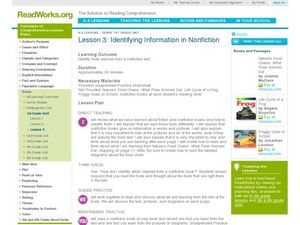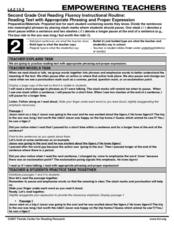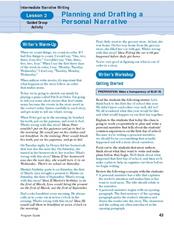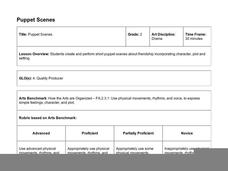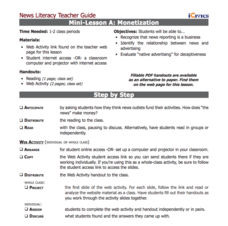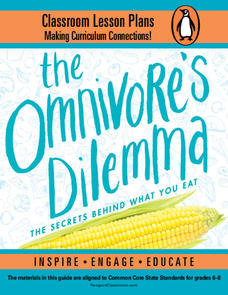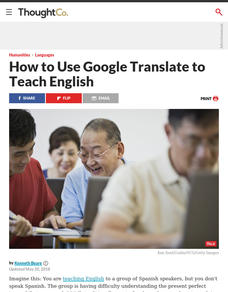Curated OER
Identifying Information in Nonfiction
Second graders investigate information in non-fiction texts. They review the features of a non-fiction text and read the book Nature's Food Chains: What Polar Animals Eat. Pupils discuss the text features and write down one fact they...
Curated OER
Lesson 2:Context Clues
Using The Life Cycle of an Emperor Penguin by Bobbie Kalman, second graders practice defining unfamilar words with context clues. They come across new vocabulary words and read the entire sentence and the sentence before...
Media Smarts
Learning Gender Stereotypes
How do media representations influence our attitudes? Examining advertisements through the filter of gender representation forms the basis of this, the second of three lessons that address gender stereotypes. Resources include links,...
Curated OER
Vocabulary Instructional Routine: Multiple Meaning Words in Context
Tackle multiple-meaning words with your youngsters using this scaffolded lesson which features a detailed script. Begin with the word shoulder, using context clues to help scholars understand the meaning. Next, they observe a second...
Curated OER
Base Words and Prefixes
Once your second graders grasp base words and prefixes, challenge them with this visual word meaning activity. They watch you model it before engaging in guided practice. Use these word cards focused on the prefix re to help your...
Curated OER
Oral Reading Fluency: Reading Text with Appropriate Phrasing and Proper Expression
Understanding punctuation is a vital part of reading with appropriate phrasing and proper expression. Second graders take care to emphasize each sentence and phrase they are reading based on punctuation. They read as a class and then on...
Curated OER
Introduce Vocabulary: Kindergarten Count to 100 (Rogers)
Combine counting and vocabulary in context using Jacqueline Rogers' Kindergarten Count to 100. Suggested words for this text are: first, fountain, salute, second, and third. By introducing the terms before reading the text,...
Curated OER
Genre Lesson: Autobiography
Start kids thinking about point of view and autobiographies by telling them a short story about your morning (first person), and then asking a volunteer to re-tell the story to you (second person). There are tips to help you tie this...
Curated OER
Genre Lesson: Biography/Autobiography
Practice distinguishing biography from autobiography through point of view. Tell a brief story of your morning. Have a class member retell the story to you (using second person). And have another retell the story to the class (using...
Curated OER
Rural Life During the Great Depression: A Year Down Yonder
“Anyone who thinks small towns are friendlier than big cities lives in a big city.” Mary Alice, the fifteen-year-old narrator of A Year Down Yonder, is forced to leave Chicago and spend a year with her Grandma Dowdel in a small rural...
Curated OER
Planning and Drafting a Personal Narrative
Bring your learners together to write a class narrative about the first day of school. Start off by teaching them about sequence with a quick oral activity. Then, work together to fill out a story map. Finally, compose the class...
Curated OER
QAR: Question Answer Relationships with an example from Canyons by Gary Paulsen
As you're reading Gary Paulsen's tale of self discovery and adventure, Canyons, bring this questioning strategy into your classroom. The QAR questioning strategy is meant to encourage a deeper analysis of the text, as some questions are...
Hawaiʻi State Department of Education
Puppet Scenes
Explore character, plot, and setting through dramatic puppet play. Second graders discuss basic story elements and then practice making a character with their sock puppets. After they've crafted a dynamic puppet, they pair up to create a...
Curated OER
Sample Lesson 1: Is This Source Credible? Useful? Why and Why Not?
Build background knowledge for The Book Thief by Markus Zusak while teaching your pupils how to determine the credibility of online sources. The plan is designed to take place over the course of two days. On the first day, model...
Project Tahoe
Does the Use of Torture on Enemy Combatants Violate the 8th Amendment?
Tackle ethics in your high school history classes with a Socratic seminar about torture as a means for obtaining information. The plan allows for pupils to take the reins during the seminar. On the first day, class members read several...
Curated OER
1984 by George Orwell
Readers of Nineteen Eighty-Four engage in a close reading exercise that directs their focus to the key details Orwell provides in the opening paragraphs to introduce his dystopian society. The included worksheeet is divided into three...
Maine Content Literacy Project
Dramatic Structure of the Short Story
The second lesson in a series of fourteen, this plan takes the short story basics a step further. Learners complete a quiz about the story from the previous day, discuss the text, learn about Anton Chekhov, and work in groups to begin...
Frank Macias Elementary School
Preparing for Guided Reading
Take your guided reading lesson plans to the next level with a collection of printables, templates, and reference tools equipped to support the reading needs of your readers. Included is a detailed information page, grouping sheet,...
iCivics
Mini Lesson A: Monetization
Advertising is everywhere! Does your class know that their attention span is for sale, even when they're watching a simple news story? The second installment in a five-part series from iCivics examines the relationship between news...
Roald Dahl
The Twits - Mrs Twit
"A person who has good thoughts cannot ever be ugly." The second lesson plan in an 11-part unit that accompanies The Twits by Roald Dahl uses poetry to encourage positive character traits. Mrs. Twit has ugly thoughts, but those...
Penguin Books
The Omnivore’s Dilemma, Young Readers Edition
As the saying goes, you are what you eat. A useful set of lesson plans encourage young readers to take a second look at their eating habits. Pre- and post-reading questions bring in reflective writing and discussion while extension...
Federal Trade Commission
Ad Targeting and Techniques
What techniques do advertisers use to reach a target audience? Pupils discover the answer with the second of four Admongo lesson plans. Scholars learn about the most common strategies advertisers use to convince people to buy something....
Curated OER
Translation Lesson to help Students Improve Vocabulary and Writing Style
Students translate an entire Internet page from English into a target language. In small groups, they create a short story or document in their native tongue or find an Internet page in their own tongue that they translate into English.
Curated OER
What's Your Favorite Food?
Advanced beginner to intermediate ESL level learners, use English to communicate in social settings by conducting a survey. They ask questions to develop new vocabulary and build communication skills.


